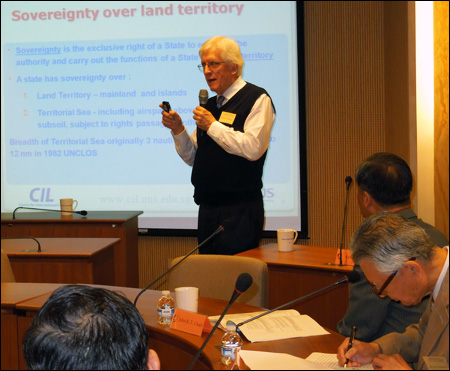Long-term vision needed on East China Sea disputes

Robert Beckman, director of the Centre for International Law of the National University of Singapore, discusses the legal status of maritime features during an international forum cosponsored by the Society of Ieodo Research, the Center for Asia-Pacific Area Studies and The Korea Times in Taipei, Taiwan, Thursday. (Photo : The Korea Times/Kim Young-jin)
Taipei ― Korea, China and Japan should take a pragmatic, long-term approach to boundary disputes in the East China Sea, experts said Friday, warning that domestic politics can rapidly escalate tensions.
The sea is the stage for complex debates over geographic features including Ieodo, a submerged rock claimed by both Seoul and Beijing; and disagreements between Japan and China.
On Thursday and Friday, an international forum here tackled the regional disputes, which in the case of the East China Sea are hampering exploration of natural resources including oil.
“Maritime issues are becoming vital in East Asian seas,” said Koh Choong-suk, president of the Society of Ieodo Research, which co-sponsored the event with the Center for Asia Pacific Studies and The Korea Times.
“We need to find resolutions to these escalating tensions so we can peacefully share the ocean.”
The three countries are party to the U.N. Convention on the Law of the Sea (UNCLOS) and have the option of arbitration. But the experts said UNCLOS is subject to interpretation and the countries see third party involvement as risky to national interest.”
While the Diaoyu/Senkaku spat between Japan and China is the most visible of the disagreements, the countries are tussling over their respective exclusive economic zones (EEZ), which give them rights to explore and the resources discovered. One such debate involves Japan’s Okinotorishima, a tiny reef, as critics say it overly expands Tokyo’s EEZ.
While it was agreed that cooler heads should prevail over the matters ― which are difficult for political and historical reasons ― views differed on how they should be handled.
Robert Beckman, director of the Centre for International Law at the National University, urged parties to seek international arbitration.
“If you want to resolve (the disputes) the best way is to give them to a neutral third party. It’s a way to move on and improve your relations,” he said.
“The problems continue to become more emotional when you don’t take it to a third party and politicians play the nationalism card because it makes them more popular at home.”
John Chao, an international law professor at the National Chengchi University in Taipei, held a different view, saying China would not likely trust an international court. He said launching joint projects could be more effective. “We need cooperation. You can do a lot of things by putting aside disputes over rocks.”
The road could be rough for now as each country must weigh domestic concerns against engagement.
In the case of China, some believe that the handover of power to its fifth generation of communist party leaders in mid-October has fueled assertiveness regarding territory.
Beijing, they said, may seek to stoke nationalist sentiment to sweep the corruption scandal surrounding Bo Xiliai under the rug. In Tokyo, politicians could push territorial disputes up on the agenda in the run-up to national elections.
Various opinions on Ieodo were also expressed.
Choi Yearn-hong, a scholar with SIR, emphasized the role of culture in settling disputes, citing a Korean myth that fishermen lost at sea would spend eternity on Ieodo.“Ieodo represents a utopia for the Jeju people,” Choi said. “We should factor in humankind.”
The Ieodo rocks became an issue in 1996 when the international community extended the maximum reach of EEZs to 200 nautical miles, this created overlapping zones among China, Japan and Korea. Ieodo falls in the overlap of the Chinese and Korean EEZ.
Seoul says that because it is 136 kilometers closer to the peninsula it could be recognized as within the nation’s maritime boundary through negotiations based on equidistance. Beijing calls for “the natural prolongation” of its land territory.
While both stances are valid under UNCLOS, the sides have failed to make headway in already a dozen rounds of negotiations.
Beckman stressed international involvement. But Yann-huei Song, a research fellow at CAPAS, said more bilateral negotiations were needed.
“The best way to resolve the dispute is to ask Beijing and Seoul to speed up the process of negotiation…then it will be easier to determine which country can exercise sovereign rights and jurisdiction,” Song said. <The Korea Times/Kim Young-jin>

























































